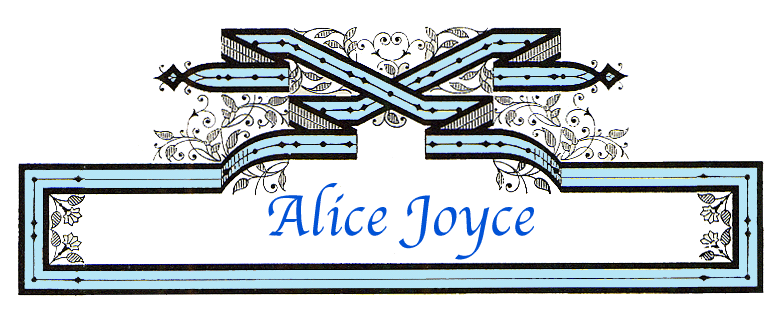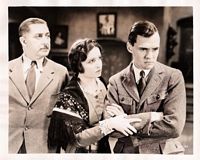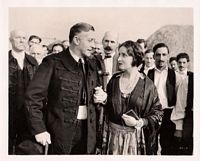

The Squall (1929) First National Pictures. Presenter: Richard A. Rowland. Director: Alexander Korda. Screenplay-Dialogue: Bradley King. Titles: Paul Perez. Photography: John Seitz. Editor: Edward Schroeder. Musical synchronization and score: Leo Forbstein. Song: Gypsy Charmer" Grant Clarke, Harry Akst. Cast: Myrna Loy, Richard Tucker, Alice Joyce, Carrol Nye, Loretta Young, Harry Cording, ZaSu Pitts, Nicholas Sousannin, Knut Erikson, George Hackathorne. 11 reels, 9,456 ft. (also released as a silent, 7,7085 ft.)
Copies of this film reside at George Eastman House, Library of Congress (35 mm.), University of Wisconsin (16mm), and it has aired on Turner Classic Movies. This film was Alice Joyce's first talkie.
| Still photos (thanks to Derek Boothroyd for these scans) |  |
 |
First National production and release. Directed by Alexander Korda, based on Bradley King's arrangement of the Jean Bart play. Recorded on Western Electric disc system, with musical score credited Leo Forbstein. At Central May 9, twice daily, $2 top. Running time 104 minutes.
| Nubi | Myrna Loy |
| Josef Lajos | Richard Tucker |
| Maria, his wife | Alice Joyce |
| Paul | Carroll Nye |
| Irma | Loretta Young |
| Peter | Harry Cording |
| Lena | Za-Su Pitts |
| El Moro | Nicholas Soussanin |
| Uncle Dani | Knute Erickson |
| Niki | George Hackathorne |
"The Squall," on screen especially if not on stage could have been written around Harry Rosenthal's privately distributed little song, "When I Lay in the Hay." As a picture this First National will get its quota of money in the regular houses for it's full of make and hay. Otherwise it's too much padded and it's not $2. Of course not $2, so few are.
The hay thing is suggested by Myrna Loy as Nubi, the gypsy girl who blew the troupe, landing in a farm house, seemingly knowing every haystack in the territory. That's where she made her dates, on the sunnyside of a stack. And on the make she did a cleanup in the farmhouse, from the hired man to the son and his father. The only one Nubi muffed was the grandfather, and, from what the girl did do the old man would have been a pushover for her.
At the Central the picture ran past its logical ending. That should have been when Nubi had to go back to the gypsies and the horsewhip. She didn't bust up the home, after all, but she put several bad dents into it. For Nubi as a gypsy was a gyp out for jewelry, etc, probably the queen of the dirty-skinned gold diggers.
Miss Loy's overconfidence in her gypsy sex prowess is doubtless the fault of the script. It is sadly apparent after the first 15 minutes what is going to happen in the remaining hour. This in itself blunts the edge for suspense. Bromides and dead pan performances by several in the cast provide an unexpected amusement at times.
Had the camera shunned close-upping Alice Joyce during her talking moments, Miss Joyce's mother who knows all but keeps mum would have been meritorious. As it is, this actress' endeavor to articulate within a few feet of the lens, coupled with a voice of monotone register, impresses as sound conscious. Her manifestations become marked, as does the audience inclinations to giggle, as she discovers the gypsy's wrecking tactics. Miss Joyce's "Oh, My God!" or "Go to your room" which she delivers numerous times to Nubi and her son, Paul, become more hacked and amusing, since the same tonality is there.
Perhaps the most natural performance is rendered by Za-Su Pitts as Lena, the house servant, whose boy friend, Peter, is the first to fall. The big Harry Cording, with a ferocious expression but light voice and select English, essays Peter excellently when he is not talking.
Loretta Young as the innocent Irma, betrothed to Paul, played by Carroll Nye, is a beautiful screen subject. Her voice, however, is identical with commencement exercises in a grammar school. Nye gives a stereotyped juvenile performance.
The inconsistent father, Josef Lajos, is played by Richard Tucker. Here, also, Tucker shows flashes of an ability cramped by directorial command.
Like the opening and closing of some theatrical shows of yore, a gang of geese and some oxen indicate the beginning and ending of each day by being paraded out of the barnyard in the morning and returning in the evening. The first few times their passing is interesting, but after that the blare of sound quacks and scientific renditions of chicks klucking becomes irritating.
The Squall was an unfortunate experience for all concerned. Alexander Korda's first talkie, and was made during that experimental period when they were finding out what worked--and what didn't--in talking films. This turned out to be one of the major misfires: it has ridiculous situations, stilted delivery of overripe dialog, an overly dramatic and nearly constant musical score, and a bizarre performance by Myrna Loy. Loy is the only cast member to seems have an inkling the disaster in the making, and really camps it up--apparently realizing it is better to look outrageous than foolish as does most of the rest of the cast. Joyce comes off fairly well in the circumstances by at least retaining her dignity--and finally getting angry enough to put a stop to all the nonsense and put the film out of its misery. Her voice is quiet and polite, a bit too much so, and she does all her acting with her face and hands. She basically gives almost the same performance as she would have in a silent, but since she was always an introverted actress it comes across as less jarring than some other talkie debuts.
Print viewed: Broadcast on Turner Classic Movies.
Last revised October 17, 2009